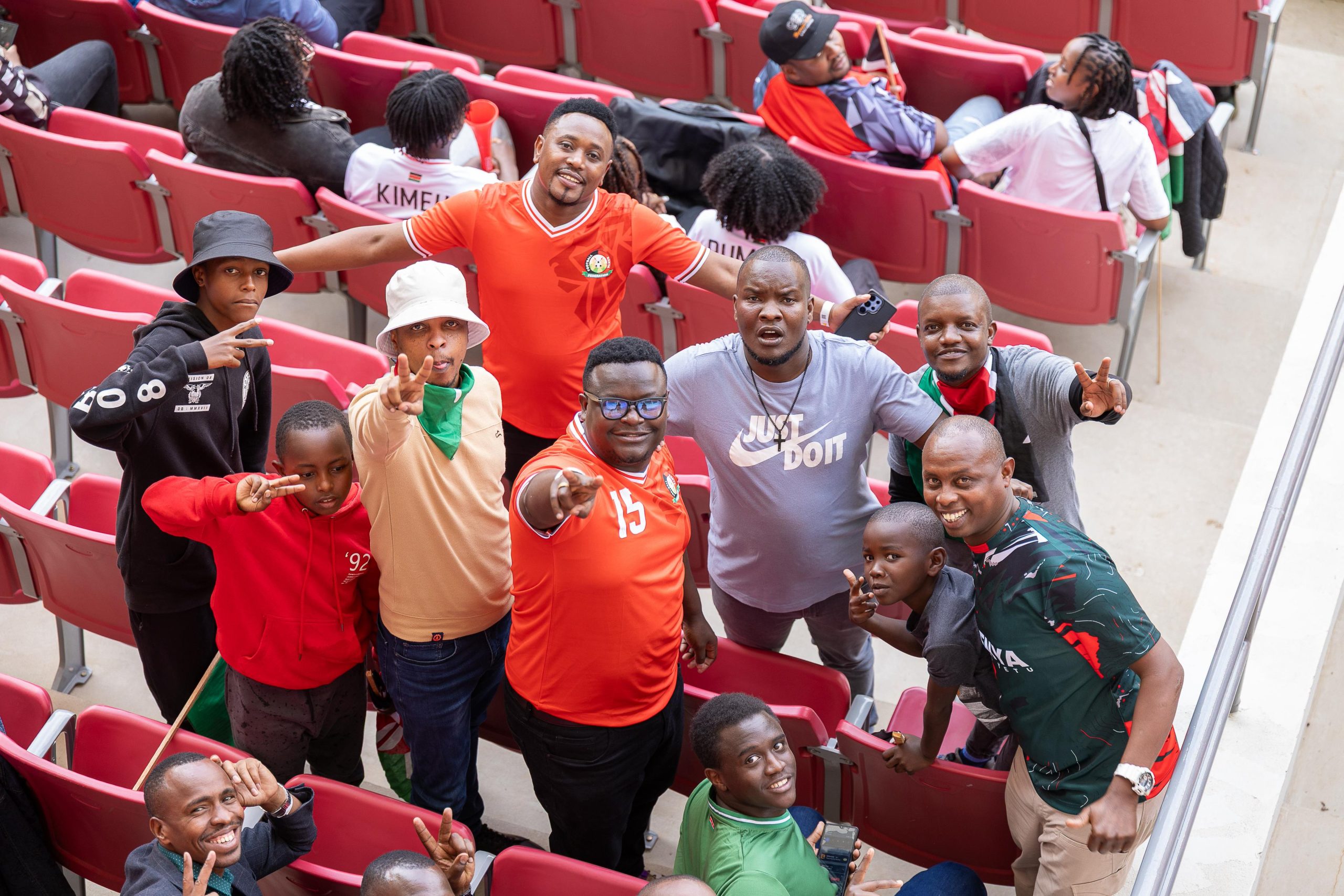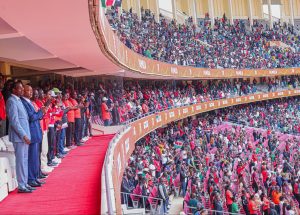Sports
Empty Seats Mystery: Why Kasarani Had Vacant Spots Despite Sold-Out CHAN Tickets

The paradox of a “sold-out” stadium with conspicuous empty seats has sparked controversy and raised questions about Kenya’s ticket distribution system for CHAN 2024.
The scene at Moi International Sports Centre, Kasarani, on Sunday told a contradictory story.
While Kenya’s Local Organising Committee (LOC) proudly announced that all 48,000 tickets for Harambee Stars’ opening CHAN 2024 match against the Democratic Republic of Congo had been sold out six days before kickoff, television cameras and stadium observers captured a different reality; rows of empty seats scattered throughout the venue, including premium VIP sections.
Despite Kenya’s impressive 1-0 victory over the two-time CHAN champions, courtesy of Austine Odhiambo’s first-half strike, the elephant in the room remained: why were there so many vacant seats in a supposedly sold-out stadium?
The discrepancy between “sold out” and actual attendance has exposed significant flaws in Kenya’s ticketing system and raised uncomfortable questions about who really had access to match tickets.
According to LOC Chairman Nicholas Musonye, approximately 46,000 tickets were sold by Saturday evening, leaving about 2,000 unsold for safety and security reasons – a standard practice in stadium management.
However, visual evidence from the match suggests far more than 2,000 seats remained empty, with notable vacant spots in VIP areas, near the media tribune, and scattered throughout the regular seating sections.
The most explosive allegation centers on claims that government operatives and politicians bought tickets in bulk to redistribute to particular individuals, with some suggesting this was aimed at neutralizing potential anti-government chants during the match.
These concerns gained traction after videos emerged on social media showing regime-affiliated politicians flaunting hard-copy tickets online.
Opposition leader Stephen Kalonzo Musyoka weighed in on the controversy, stating that bulk buying of tickets had denied genuine fans an opportunity to enjoy football, describing it as contrary to the universal language of soccer that brings people together.
The timing of these allegations is particularly sensitive given Kenya’s recent months of deadly protests over economic hardship and police brutality, with demonstrators frequently chanting “Ruto Must Go” and “Wantam.”
Critics suspect the government deliberately filled the stadium with supporters to prevent potential embarrassing anti-government demonstrations on live television.
Musonye has categorically dismissed the hoarding allegations, insisting the ticketing process was transparent and managed by the Confederation of African Football (CAF), not local organizers.
“The issue of hoarding tickets was not there. The Harambee Stars vs DRC tickets were open to the market, and they were sold by CAF, not us,” he explained during an NTV morning show appearance.
The LOC chairman emphasized that stadiums never sell 100% of their capacity for safety reasons, requiring “breathing space” for emergency situations. However, his explanation doesn’t fully account for the scale of empty seats observed during the match.
Despite official denials, evidence suggests a thriving secondary ticket market existed.
A caller named David contacted a local TV show to confirm purchasing his ticket on Sunday from an individual in town for Sh250 – Sh50 more than the official Sh200 regular ticket price.
He revealed that “tickets were being sold at the flyover near Safari Park Hotel” and expressed confidence he could acquire tickets for Kenya’s upcoming match against Angola through the same channels.
This testimony directly contradicts official statements that no tickets were available and highlights the existence of unauthorized ticket resales, suggesting some individuals had acquired multiple tickets for profit.
The ticketing controversy had real consequences for genuine fans.
Hundreds of DRC supporters were locked out despite having money to purchase tickets, with only about 200 Congolese fans gaining stadium access – far short of their target of 2,000.
William Saidi, president of the Youth Diaspora Congolese in Kenya, reported that even embassy intervention failed to resolve the situation, forcing two buses full of supporters to return home disappointed.
Local Kenyan fans also struggled to secure tickets through official channels, despite the stadium not reaching full capacity – a situation that defies basic supply and demand logic.
The Kasarani ticketing fiasco reveals deeper problems with Kenya’s event management systems:
Transparency Gaps: The exclusively online ticketing system through chan.mookh.com, while convenient, created opacity around actual sales figures and distribution methods.
Poor Communication: Conflicting statements about ticket availability and sales numbers undermined public trust and fueled conspiracy theories.
Security vs. Accessibility: While safety concerns are legitimate, the failure to communicate capacity limitations clearly contributed to public confusion and suspicion.
Political Interference: Whether real or perceived, allegations of political manipulation of ticket distribution have damaged the credibility of future sporting events.
Kalonzo has pledged to sponsor 500 fans for upcoming CHAN matches, highlighting the ongoing access issues facing ordinary supporters.
The LOC has promised to investigate any illegal ticket sales and take necessary action, though concrete steps remain unclear.
For Kenya’s remaining CHAN 2024 matches against Angola, Morocco, and Zambia, organizers must address these systemic failures to restore public confidence.
The success of hosting this continental tournament should be measured not just by on-field results, but by ensuring genuine fans can access and enjoy the beautiful game without political interference or administrative incompetence.
The empty seats at Kasarani tell a story of missed opportunities – not just for the fans denied entry, but for a country that deserves better from its sporting institutions.
As Kenya continues its CHAN journey, the real test will be whether lessons are learned from this ticketing debacle, or whether future matches will repeat the same disappointing pattern of promise versus reality.
Kenya faces Angola in their next CHAN 2024 Group A match on Thursday, August 8, at Kasarani Stadium. Fans are advised to purchase tickets through official channels at chan.mookh.com
Kenya Insights allows guest blogging, if you want to be published on Kenya’s most authoritative and accurate blog, have an expose, news TIPS, story angles, human interest stories, drop us an email on [email protected] or via Telegram
-

 Grapevine2 weeks ago
Grapevine2 weeks agoRussian Man’s Secret Sex Recordings Ignite Fury as Questions Mount Over Consent and Easy Pick-Ups in Nairobi
-

 News1 week ago
News1 week agoTHE FIRM IN THE DOCK: How Kaplan and Stratton Became the Most Scrutinised Law Firm in Kenya
-

 Investigations1 week ago
Investigations1 week agoMulti-Million Dollar Fraud: Three Kenyans Face US Extradition in Massive Cybercrime Conspiracy
-

 Economy1 week ago
Economy1 week agoIran Demands Arrest, Prosecution Of Kenya’s Cup of Joe Director Director Over Sh2.6 Billion Tea Fraud
-

 Business1 week ago
Business1 week agoA Farm in Kenya’s Rift Valley Ignites a National Reckoning With Israeli Investment
-

 Africa2 weeks ago
Africa2 weeks agoFBI Investigates Congresswoman Ilhan Omar’s Husband’s Sh3.8 Billion Businesses in Kenya, Somalia and Dubai
-

 Grapevine4 days ago
Grapevine4 days agoA UN Director Based in Nairobi Was Deep in an Intimate Friendship With Epstein — He Even Sent Her a Sex Toy
-

 Politics2 weeks ago
Politics2 weeks agoSifuna, Babu Owino Are Uhuru’s Project, Orengo Is Opportunist, Inconsequential in Kenyan Politics, Miguna Says

















